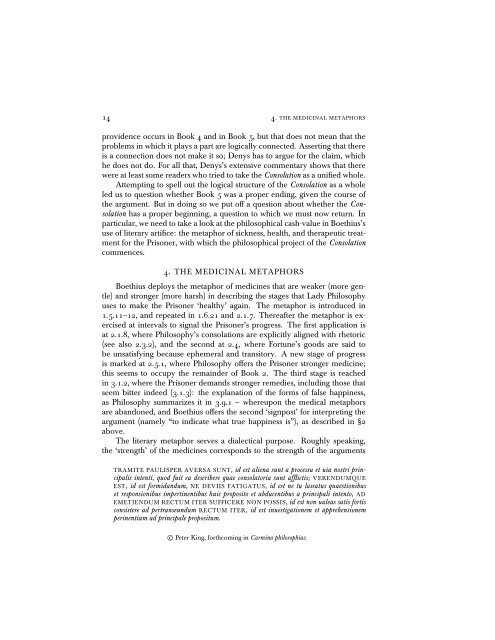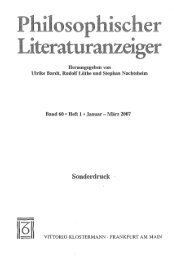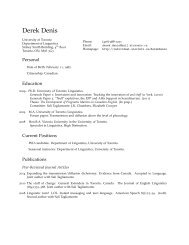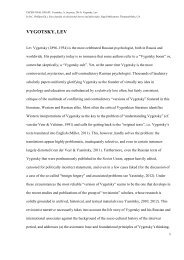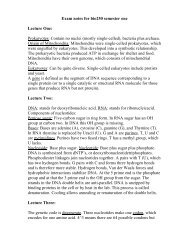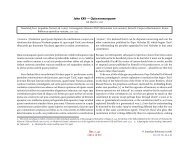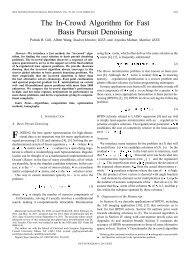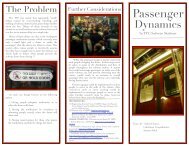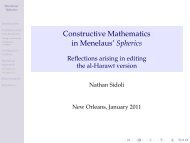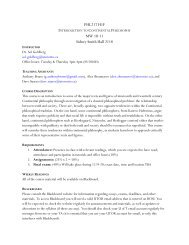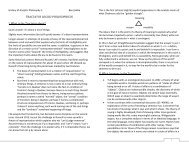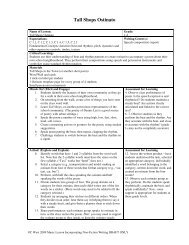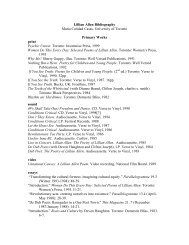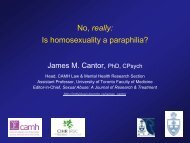BOETHIUS: FIRST OF THE SCHOLASTICS* - University of Toronto
BOETHIUS: FIRST OF THE SCHOLASTICS* - University of Toronto
BOETHIUS: FIRST OF THE SCHOLASTICS* - University of Toronto
You also want an ePaper? Increase the reach of your titles
YUMPU automatically turns print PDFs into web optimized ePapers that Google loves.
14 4. <strong>THE</strong> MEDICINAL METAPHORS<br />
providence occurs in Book 4 and in Book 5, but that does not mean that the<br />
problemsinwhichitplaysapartarelogicallyconnected. Assertingthatthere<br />
is a connection does not make it so; Denys has to argue for the claim, which<br />
he does not do. For all that, Denys’s extensive commentary shows that there<br />
wereatleastsomereaderswhotriedtotaketheConsolation asaunifiedwhole.<br />
Attempting to spell out the logical structure <strong>of</strong> the Consolation as a whole<br />
led us to question whether Book 5 was a proper ending, given the course <strong>of</strong><br />
the argument. But in doing so we put <strong>of</strong>f a question about whether the Consolation<br />
has a proper beginning, a question to which we must now return. In<br />
particular,weneedtotakealookatthephilosophicalcash-valueinBoethius’s<br />
use<strong>of</strong> literaryartifice: themetaphor<strong>of</strong>sickness,health,andtherapeutictreatment<br />
for the Prisoner, with which the philosophical project <strong>of</strong> the Consolation<br />
commences.<br />
4. <strong>THE</strong> MEDICINAL METAPHORS<br />
Boethius deploys the metaphor <strong>of</strong> medicines that are weaker (more gentle)<br />
and stronger (more harsh) in describing the stages that Lady Philosophy<br />
uses to make the Prisoner ‘healthy’ again. The metaphor is introduced in<br />
1.5.11–12, and repeated in 1.6.21 and 2.1.7. Thereafter the metaphor is exercised<br />
at intervals to signal the Prisoner’s progress. The first application is<br />
at 2.1.8, where Philosophy’s consolations are explicitly aligned with rhetoric<br />
(see also 2.3.2), and the second at 2.4, where Fortune’s goods are said to<br />
be unsatisfying because ephemeral and transitory. A new stage <strong>of</strong> progress<br />
is marked at 2.5.1, where Philosophy <strong>of</strong>fers the Prisoner stronger medicine;<br />
this seems to occupy the remainder <strong>of</strong> Book 2. The third stage is reached<br />
in 3.1.2, where the Prisoner demands stronger remedies, including those that<br />
seem bitter indeed (3.1.3): the explanation <strong>of</strong> the forms <strong>of</strong> false happiness,<br />
as Philosophy summarizes it in 3.9.1 — whereupon the medical metaphors<br />
are abandoned, and Boethius <strong>of</strong>fers the second ‘signpost’ for interpreting the<br />
argument (namely “to indicate what true happiness is”), as described in §2<br />
above.<br />
The literary metaphor serves a dialectical purpose. Roughly speaking,<br />
the ‘strength’ <strong>of</strong> the medicines corresponds to the strength <strong>of</strong> the arguments<br />
TRAMITE PAULISPER AVERSA SUNT, id est aliena sunt a processu et uia nostri principalis<br />
intenti, quod fuit ea describere quae consolatoria sunt afflictis; VERENDUMQUE<br />
EST, id est formidandum, NE DEVIIS FATIGATUS, id est ne tu lassatus quaestionibus<br />
et responsionibus impertinentibus huic proposito et abducentibus a principali intento, AD<br />
EMETIENDUM RECTUM ITER SUFFICERE NON POSSIS,id est non ualeassatisfortis<br />
consistere ad pertranseundum RECTUM ITER, id est inuestigationem et apprehensionem<br />
perinentium ad principale propositum.<br />
c○ Peter King, forthcoming in Carmina philosophiae.


